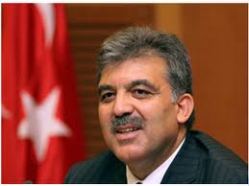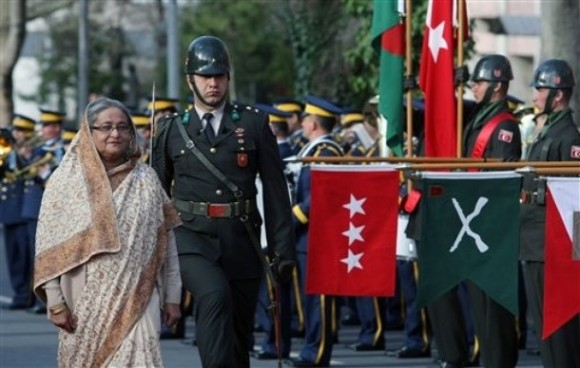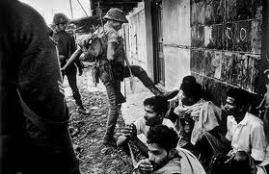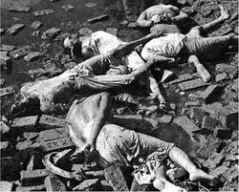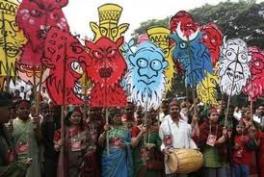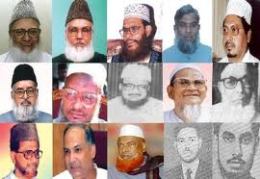The word ‘hammam khana’ raised my curiosity when I first read it as a student of Class V. Don’t remember now which book actually, but ever since I have been looking for opportunities to visit the place where a perfect hamam or Turkish bath is available. I can still remember what I read about hamam, which has been popular as a method of cleansing and relaxation since the Victorian era. The process of Turkish bath is like a sauna experience but one may find it more interesting to be scrubbed. Thanks to youtube and wikipedia for more of my theoretical and visual understanding on Turkish bath, first you have to relax in a room (the warm room). This room is heated by a continuous flow of hot and dry air and it will allow you to perspire freely. You may then get into an even hotter room (the hot room) before splashing yourself with cold water. After a full body wash and receiving a massage, you finally retire to the cooling-room for a period of relaxation. Such a nice experience I am yet to have but I can suggest it for those who need it most now.
On the 28th of December, 2012, Dhaka’s leading English language daily wrote its headline: “Tension with Turkey: Dhaka surprised as Gul calls upon Zillur to pardon war crimes accused” (Link at the bottom). Two days later, Hurriyet Daily News in Istanbul made its headline: “Bangladesh ties strained”. A detail of what had happened between the two should be summed up first.
Turkish President Abdullah Gul wrote a letter to Bangladeshi President Zillur Rahman calling for “clemency” to the accused under trial in the International Crimes Tribunal (ICT) for the “sake of peace in the society”, according to the Daily Star (DS) newspaper. He demanded that the accused belonging to the Jamaat-e-Islami party be pardoned as they are too old to stand trial. Mr. Gul apprehended that the trial might cause a civil war in Bangladesh, the DS report said. The letter irked the Bangladesh government and it took the letter from the Turkish president very seriously. The letter was “not acceptable at all” and the government viewed it as “a clear interference in the internal affairs of Bangladesh.” Moreover, Bangladesh asked the international community not to make any requests in favor of those facing trial in the ICT. “Bangladesh does not want anyone to make any request or recommendation for the persons accused of war crimes,” Foreign Minister Dipu Moni said, according to the newspaper reports.
This was not alone. A visit of a 14-member delegation of Turkish NGO Cansuyu Aid and Solidarity Association from December 20 to 24 actually made the initial trouble. The DS report said the delegation member came “hiding their identity and misusing ‘on arrival visa’ facilities and its inappropriate activities have made Dhaka too unhappy.” This incident prompted the Bangladeshi Foreign Ministry (MOFA) to “summon” the Turkish envoy Mehmet Vakur Erkul and the MOFA asked him to explain the NGO team’s visit ‘without informing the government’. The DS report used the word “summon” but Turkish Hurriyet newspaper did not do the same in its report on the 31st (http://www.hurriyet.com.tr/planet/22265928.asp). They used the word “invited” when the Bangladeshi Ambassador Md Zulfiqur Rahman was ‘summoned’ at the Turkish Foreign Ministry (Its my guess that the official at the Turkish Foreign Ministry while briefing the reporter on the news deliberately used the word “invite” instead of the word “summon”. This does not mean that Bangladeshi Foreign Ministry source of the DS newspaper did the mistake by using the word “summon”. It may be an example of sexing up the story by using hard-hitting words. Or the word may be used by the MOFA official deliberately.)
The DS report said that the Bangladeshi acting Foreign Secretary Mustafa Kamal had handed over an aide memoir (diplomatic letter) to the Turkish Ambassador in which Dhaka strongly protested Gul’s letter and said it was an interference in the internal affairs of the country. The aide memoir categorically mentioned that Bangladesh government is determined to conduct the war crimes trial as there is overwhelming support from the people. It said the trial is taking place in the most transparent way by maintaining international standard, and categorically stated that the government will not compromise on this specific issue. “Bangladesh believes that it is not the job of a friendly country to create any problem or confusion about an issue and hopes that this type of incident will not happen again,” the letter stated. Dhaka considered Gul’s letter as the first ever interference since the ICT was formed in 2010.
I am not sure if the Turkish President had written anything on the two other accused from the BNP party or not. Most probably not and I will be surprised if he had written anything. One of those two is Salauddin Qader Chowdhury who wanted to become OIC Secretary General, but was defeated to Turkey’s Ekmeleddin Ihsanoglu. There was indirect pressure on Dhaka to support the Turkish candidate, which it did not at that time.
Anyway, it is clear now that Dhaka did not like the way Ankara approached on the issue. On the non-government side, the Armenian-button was pushed. Different political, social and cultural organisations strongly condemned the Turkish president for his request. Ekattorer Ghatak Dalal Nirmul Committee, a civic group which has been demanding trial and punishment of war crimes issued a statement and said Turkish president’s request is not only against the diplomatic norms and interference in the internal affairs of Bangladesh, but also a blow to its independence and sovereignty. “The Turkish president should remember that Turkey had committed the first genocide in the world in the last century,” they said, adding that Turkey had killed 1.5 million Armenians from 1919 to 1921, but no trial was held for the killings. Turkey is still killing Kurdish people without any trial, the DS newspaper quoted the statement as saying. Moreover, Bangladesh Udichi Shilpigosthi in a separate statement said that conspiracies to foil the ongoing trial of the 1971 crimes against humanity were going on at home and abroad. The Turkish president’s request is a ‘shameless expression of that conspiracy’. The Udichi leaders strongly condemned and protested the Turkish president and demanded Bangladesh government take appropriate and hard diplomatic steps to this end.
It will be a good lesson for Turkey as well because it has been aiming high (a detail is available here http://www.mfa.gov.tr/synopsis-of-the-turkish-foreign-policy.en.mfa). But Bangladesh should keep the internal dynamics of Turkey in mind. In 2002, Islamist Justice and Development Party (AKP) clinched a landslide election victory. And according to BBC analyses, such victory of AKP resurfaced ‘concerns over the potential for conflict between a secular establishment backed by the military and a traditional society deeply rooted in Islam’. According to the BBC (link at the bottom), “The secularist opposition has on several occasions since then challenged the constitutional right of the AKP to be the party of government. In March 2008 the Constitutional Court narrowly rejected a petition by the chief prosecutor to ban the AKP and 71 of its officials, including President Abdullah Gul and Prime Minister Recep Tayyip Erdogan, for allegedly seeking to establish an Islamic state. The government has accused military officers of plotting to overthrow it through an alleged secret organisation called Ergenekon (Sledgehammer), which led to the jailing of three generals for 20 years and lesser sentences against more than 300 other officers in 2012, as well as dividing public opinion. The officers involved accuse the government of a show trial to neutralise the anti-Islamist influence of the armed forces in politics. The chiefs of staff resigned in the summer of 2011 in protests at the arrests of officers, and the government rather than the military appointed their successors for the first time.” According to the party website, the AKP has a Target 2023 for the country by which they want the GDP per capita to exceed $25,000 and place Turkey in the rank among world’s top 10 economies. Quite ambitious indeed and definitely possible!
On the other hand, Bangladesh is now governed by Awami League-led 14 party alliance which is known to be secular. But this was not a problem and everything was fine until this NGO visit and Gul’s letter. There has been strong bilateral relations with strong historical and cultural roots. Turkey acknowledges the support of Bangladeshi people during Turkish War of Independence. There has been official visits of President Abdullah Gül and Prime Minister Recep Tayyip Erdoğan, in February 2010 and November 2010, respectively while Bangladeshi Prime Minister Sheikh Hasina paid a visit to Turkey to attend the UN Least Developed Countries Conference in İstanbul, in May 2011. The bilateral trade volume has extensively increased in recent years. Military level contacts are also notable. The respect and admiration of the people of Bangladesh to Mustafa Kemal Atatürk has its reflections in “Kamal Pasha”, the epic poem written by Kazi Nazrul Islam, National Poet of Bangladesh in 1921. Since then the poem has been on the curriculum in Bangladeshi schools. Besides, one major avenue in Dhaka and another one in Chittagong were named “Mustafa Kemal Atatürk Avenue” as well as a high school in Dagan Bhuiyan, in Feni named “Atatürk Model High School” as a manifest of respect to Mustafa Kemal Atatürk by Bangladeshi people. And this list is longer than this.
Now my question is whether Dhaka or Ankara over reacted given the level of relationship. I would say both the action and the reaction was strong. Dhaka has a sensitivity on the issue as trial is a major election pledge of the ruling party in Bangladesh and according to many analysts, this will be a key issue in the next election again. The ruling Awami League party has been smelling, what it says, “deep conspiracy nationally and internationally” to foil the trial. There has been media campaign, lobbying and so on over the issue! The Turkish letter was exactly what the Bangladesh government was looking for to prove its claim. But, what’s next? Let me give some clue. Turkish Hurriyet newspaper reports (http://www.hurriyet.com.tr/planet/22265928.asp) that Golam Azam, one of the accused in the ICT and a kingpin will be executed and the execution will take place on March 26, 2013. I did not see that information in any Bangladeshi newspaper so far. This story on Hurriyet attracted many interesting comments. The story was shared by many on facebook, twitter and google. For Bangladesh government, the challenge is communicating the foreign publics and make them understand its policy over the trial and why it is so important. Although, Bangladeshi Foreign Minister made it clear that Dhaka does not want any request for the persons accused of war crimes, but Turkey may not be the last country and that NGO may not be the last organisation. For Turkish government, however, the challenge is to digesting the response from Bangladesh and try a détente diplomacy if not something else.
Let’s go to hamam and get ready for a Turkish bath!
Links:
http://www.hurriyetdailynews.com/bangladesh-ties-strained.aspx?pageID=238&nID=38015&NewsCatID=338
http://www.hurriyet.com.tr/planet/22265928.asp
http://newagebd.com/detail.php?date=2012-04-13&nid=7062#.UOrUAxz2Xw4
http://www.mfa.gov.tr/turkey–bangladesh-relations.en.mfa
http://www.todayszaman.com/newsDetail_getNewsById.action?newsId=277907
http://nazrulinstitute.org.bd/en_index.php?pg=enbook
https://www.cia.gov/library/publications/the-world-factbook/geos/tu.html
http://www.bbc.co.uk/news/world-europe-17988453
http://www.akparti.org.tr/english
http://www.mfa.gov.tr/turkey–bangladesh-relations.en.mfa
http://www.thedailystar.net/newDesign/latest_news.php?nid=43528
